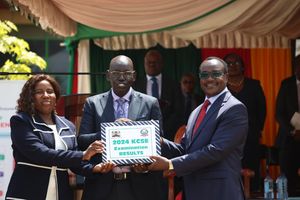Sudan coup: US threatens to cut off aid

Sudanese demonstrators raise national flags as they take part in a protest in the city of Khartoum Bahri, the northern twin city of the capital, to demand the government's transition to civilian rule, on October 21, 2021.
The US on Monday warned it could cut off more aid to Sudan’s transitional project after the military took over the government and detained Prime Minister Abdalla Hamdok.
Jeffrey Feltman, the US special envoy for the Horn of Africa, warned the move by the military put at risk the support that Washington had channelled to the country, which until December last year was under US sanctions.
“The US is deeply alarmed by reports of a military take-over of the transitional government. This would contravene the Constitutional Declaration and the democratic aspirations of the Sudanese people and is utterly unacceptable,” Feltman said.
“As we have said repeatedly, any changes to the transitional government by force puts at risk US assistance.”
Sudan was on Monday morning gripped with uncertainty after military agents detained Hamdok at his home.
And it came just two days after Feltman arrived in Khartoum on Saturday to help lower tensions between government factions in Sudan, and prevent what could stall a much-needed transition.
On his second trip to Khartoum since he was assigned the role in the troubled region, he held a series of talks with the Sudanese minister of foreign affairs, Maryam Al-Mahdi, on developments in the current political situation, and the efforts of the transitional government to achieve democratic transformation.
His trip came against the backdrop of parallel protests in support of the two factions - the military and civilian components - of the transitional regime.
Protesters have been pouring into the streets of Khartoum and other major urban areas.
A majority of the marchers demanded a total transition to civilian rule, starting with a change of guard at the Transitional Sovereign Council now headed by the military, but which should have been under civilian leadership since last year, under a power-sharing agreement signed in August 2019.
Feltman affirmed the need for stability and peace in Sudan through democratic transition, and the strengthening of partnerships between the parties in the transitional government, urging constitutional bodies to expedite the formation of the Transitional Legislative Council.
It was unclear if he issued any ultimatums, although his visit to Khartoum signalled that Washington wants the political transition to succeed.
Sudan has been ruled under this arrangement since the ouster of Omar al-Bashir in April 2019. Bashir is serving jail time for corrupt dealings during his 30-year tenure.
His lieutenants, though, continue to roil the transition, as illustrated by two ‘mutiny’ incidents over the past two years that officials said were ‘coup attempts’ meant to stall security and economic reforms.
One incident happened in September and the Council quickly claimed it had put down a coup attempt led by Bashir’s loyalists.
In the past 10 days, though, tensions have escalated between the military and civilian partners in the transitional government, fuelling opposing protests in the streets.
The military had closed streets in the final days of Bashir’s regime following months of civilian protests over rising cost of living and insecurity. Now the military is being accused of delaying the transition so as to remain in power.
Last year, the Council’s leadership was supposed to be handed over to the civilian faction. It was delayed to this year and is supposed to happen next month. The protests, though, present a new threat to that change of guard.






